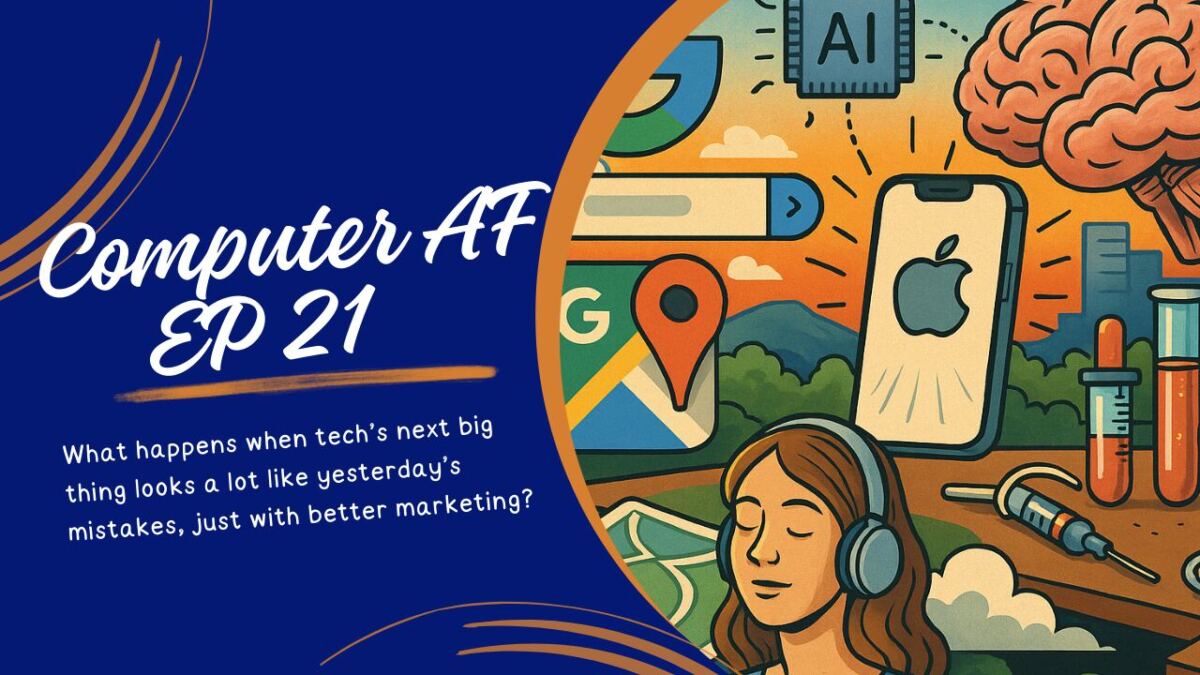In this episode of Computer AF, hosts Anne Ahola Ward and John Boitnott dove headfirst into the digital chaos, where Google is quietly swapping nostalgia for algorithmic intelligence, Apple wants to stream wellness into your skull, and the ghost of Theranos apparently still has a pitch deck.
What began as a conversation about interface tweaks quickly spiraled into a larger reflection on how major tech players are repositioning themselves in the age of AI. Google’s move to replace the classic “I’m Feeling Lucky” button with a generative AI prompt might seem harmless, but it’s a telling shift. The button, once a symbol of web-era curiosity, now gives way to a system trained to anticipate what you want before you type it. It’s less about exploration and more about curation, and not necessarily by a human.
Meanwhile, Apple is exploring brain-computer interfaces and rolling out “Sound Therapy” through Apple Music in the same breath. On the surface, these seem like separate initiatives: one targets the mind directly, the other gently coaxes it toward calm. But together, they point toward a not-so-subtle goal — getting as close to the user’s mental state as possible, ideally without them even noticing (paranoia ensues). It’s personalization meets preemption, wrapped in a clean UI.
Despite the march of innovation, Ward and Boitnott made it clear that the tech may be advanced, but the human experience around it is becoming less intuitive. AI is everywhere, but using it still feels like babysitting a machine that sometimes forgets what it’s doing. For all the promise of content automation and productivity enhancement, basic things — like writing a reliable recipe or explaining legalese in a class-action email — often require more oversight than if you’d just done it yourself.
And that’s not just an AI problem. It’s a design one. Whether it’s navigating crypto wallet setups or figuring out how many “Z-coins” are in your “Z-cash” app, most systems seem built on the assumption that users will fight their way through, just to participate. Computer AF reminds us this isn’t sustainable — because at some point, if you have to do more work to automate something than it would take to just think or click yourself, the promise breaks down.
In between all this, the hosts pivoted to one of the episode’s more surreal turns: the reported comeback attempt of Billy Evans. No, not the mashed potato magnate (brand), but husband of Elizabeth Holmes, who is allegedly fundraising for a new blood testing startup while Holmes herself serves time in federal prison for, well, trying to do exactly that. It’s a moment that practically writes its own satire, but it also highlights a deeper truth that tech culture’s appetite for reinvention rarely extends to accountability.
Throughout the episode, Ward and Boitnott do what Computer AF does best — highlight the friction between the increasingly abstract direction of technology and the very real people still trying to keep up with it. Whether it’s Gen Z forgetting how to read a map, Apple offering “wellness waves” while quietly planning to sync with your brain, or a growing sense that every platform is becoming slightly more manipulative, the show captures a snapshot of tech in transition. Not forward or backward, just stranger.
The takeaway isn’t that AI is evil or that innovation should stop. It’s that all this advancement means very little if it’s inaccessible, opaque, or actively disorienting. And that’s the sweet spot Computer AF lands in: serious observations, made digestible by a little wit and a lot of lived experience.
Want more Computer AF? Check out the other articles or watch the show on YouTube.

